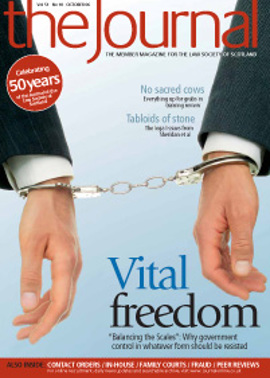To amend or not to amend?
Third party rights of appeal (TPRA) remains one of the hot topics relating to the Planning etc (Scotland) Bill, as is whether the Scottish Executive wishes to adopt a “softer” approach on this issue.
The Scottish Executive seems to favour frontloading the system with a consultative pre-application process. The community would be encouraged to take an active part in the new planning system and become stakeholders in the decision process. The draft Planning Advice Note (PAN), “National Standards for Community Engagement”, on which consultation closed earlier this month, sets out the framework within which Scottish Ministers, planning authorities and communities can interact and influence the planning process. The planning authority would have three key roles: facilitating engagement in the preparation of development plans; planning decisions; and enforcement action. The draft PAN does recognise the difficulties in creating engagement with the community, i.e. getting individuals to be part of the planning process as it evolves.
How to engage?
As the bill progresses through stage 2, the committee is facing the difficult issue of how community engagement can be assessed and established. There is concern that it will become a consultation “tick box exercise” and that it will be impossible to separate the interests of the community from the interests of individuals. More detail is required to create the connection between the planning committee and the community. Thankfully the draft PAN has recognised the importance of this and could dictate the extent of the bill’s success.
Jackie Baillie MSP has suggested an interesting halfway step, between community engagement and TPRA, known as a community right of notification. This would give registered community groups the right to ask ministers to call in applications, effectively shifting a significant level of power to community groups. This might ensure that both applicants and planning authorities take the proposed consultation process more seriously. Developers would require not only approval from the planning authority but, in essence, approval from the people within the community who bear the end result. The community would be given an identified role within the planning process to convey their concerns more directly and independently than filtered through the planning committee.
Consultation before, or appeal after
Should ministers simply create TPRA instead? The Irish planning system provides TPRA against planning permissions, with restrictions on who can exercise that right. A number of applications appealed in this way seek to amend the type or design of the development rather than quash it. For many, the chance to object after a local planning authority has made a decision can be critical. Some fear that TPRA would allow too many people to interfere with the planning system and encourage frivolous and vexatious appeals. In Ireland this has rarely been the case. Friends of the Earth, advocates of TPRA, suggest it provides a level playing field between the public and developers, increases local authority accountability, and strengthens the role of the development plan. But how far will the Planning Bill be amended to allow planning decisions to be appealed by a wider community? At the moment emphasis is placed on consultation, in the hope this allows the correct decision to be made rather than allow a wider right of appeal against the “wrong” decision.
A difficult balance
The wider effects of developing a planning system, whether from community engagement or TPRA, must be considered. A more transparent system, allowing access for individuals and communities to engage directly with the planning system, can only create a degree of uncertainty for the developer. Can the all-important funders of a development cope with a higher degree of uncertainty? Can an accurate timetable for development be possible when further hurdles are placed within the planning system, making the commercial viability less likely? Planning can bring economic growth, but can wider participation within the planning process curtail such a benefit?
To amend or not to amend, that is the question. Community engagement is certainly the right move if the aim is to make the planning system more accessible and transparent. People within the community can develop trust in a system that allows that community to play a part in its future development. There is recognition within the draft PAN of the difficulties that lie ahead in trying to encourage individuals and groups to take the opportunities on offer. There is much debate about how the community and the planning authority can work side by side to ensure that decisions taken address the concerns of the individual, the community, the planning authority, and the commercial interests of the developer. This will be a difficult forum to create through the Planning Bill, but it is something that could put much-needed confidence back into a system that currently struggles to balance those interests. There are no easy answers, just easy questions.
Jason Mackay and Robin Priestley, Planning and Environment, Anderson Strathern
In this issue
- TUPE passes the buck (1)
- Survival of the fittest? A reply
- Channels of communication
- Time to discard the PIPs
- Speaking in the public interest
- Education's Big Bang
- If you can't say anything nice...
- Lesbian families, parenthood and contact
- Keep it in the family
- End of the peer show
- New chambers challenges Faculty Services
- Cash without borders
- Fraud - the threat from within
- Note it down - or lose out
- Balancing privacy and data sharing
- Provoking argument
- To amend or not to amend?
- Purchases under test
- TUPE passes the buck
- Scottish Solicitors' Discipline Tribunal
- Website reviews
- Book reviews
- Law or regulation? The blurring gets more blurred
- Registers success with direct debit






